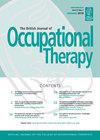The relationship between occupational therapists’ organizational commitment, perceived organizational support, and entrepreneurial orientations
IF 1.3
4区 医学
Q3 REHABILITATION
引用次数: 0
Abstract
Introduction:Entrepreneurial orientation is a critical factor in the success of an organization and encourages higher performance. Individual entrepreneurial orientation can be influenced by organizational commitment and perceived organizational support. The study aimed to examine the relationship between occupational therapists’ organizational commitment, perceived organizational support levels, and their individual entrepreneurial orientation.Method:Using an online form, a cross-sectional survey study was conducted with 88 occupational therapists aged between 22 and 28. Occupational therapists completed a socio-demographic information form, the Organizational Commitment Scale, the Perceived Organizational Support Scale, and the Individual Entrepreneurial Orientation Scale. Data were analyzed using descriptive statistics and correlation analysis.Results:Significant positive correlations were found between occupational therapists’ individual entrepreneurial orientations and organizational commitment ( p = 0.015; r = 0.260) and perceived organizational support ( p = 0.045; r = 0.214).Conclusion:This study indicates that occupational therapists’ individual entrepreneurial orientation increases when their levels of organizational commitment and perceived organizational support increase. Therefore, organizations should strive to maintain high levels of organizational commitment and the support provided by the organization to enhance the entrepreneurial orientation of occupational therapists, which is important for their creativity and innovation.职业治疗师的组织承诺、感知到的组织支持与创业取向之间的关系
导言:创业导向是一个组织成功与否的关键因素,它能促进组织提高绩效。个人创业取向会受到组织承诺和感知到的组织支持的影响。本研究旨在探讨职业治疗师的组织承诺、感知到的组织支持水平与其个人创业取向之间的关系。方法:本研究使用在线表格,对 88 名年龄在 22 岁至 28 岁之间的职业治疗师进行了横断面调查研究。职业治疗师填写了社会人口信息表、组织承诺量表、感知组织支持量表和个人创业取向量表。结果:职业治疗师的个人创业取向与组织承诺(p = 0.015;r = 0.260)和感知组织支持(p = 0.045;r = 0.214)之间存在显著的正相关。因此,组织应努力保持高水平的组织承诺和组织提供的支持,以增强职业治疗师的创业导向,这对他们的创造力和创新能力非常重要。
本文章由计算机程序翻译,如有差异,请以英文原文为准。
求助全文
约1分钟内获得全文
求助全文
来源期刊

British Journal of Occupational Therapy
REHABILITATION-
CiteScore
2.20
自引率
15.40%
发文量
81
审稿时长
6-12 weeks
期刊介绍:
British Journal of Occupational Therapy (BJOT) is the official journal of the Royal College of Occupational Therapists. Its purpose is to publish articles with international relevance that advance knowledge in research, practice, education, and management in occupational therapy. It is a monthly peer reviewed publication that disseminates evidence on the effectiveness, benefit, and value of occupational therapy so that occupational therapists, service users, and key stakeholders can make informed decisions. BJOT publishes research articles, reviews, practice analyses, opinion pieces, editorials, letters to the editor and book reviews. It also regularly publishes special issues on topics relevant to occupational therapy.
 求助内容:
求助内容: 应助结果提醒方式:
应助结果提醒方式:


